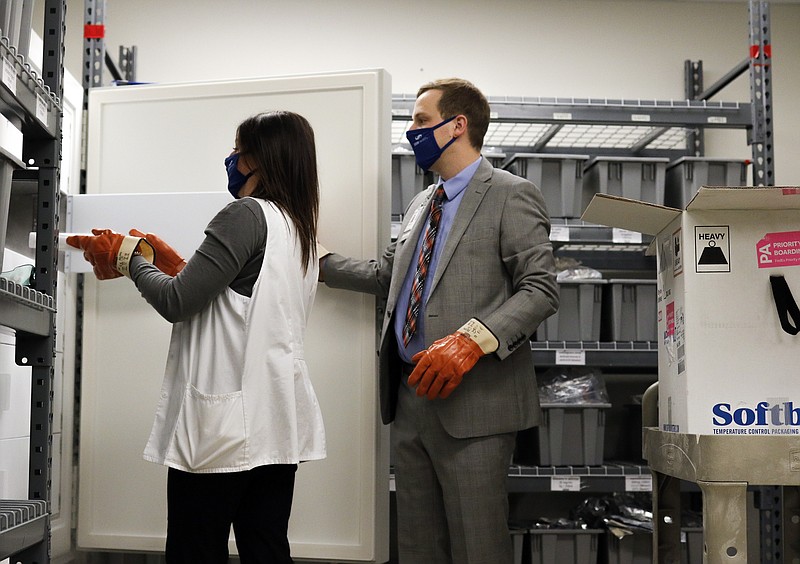Alyssa Neitzert, an emergency department nurse practitioner, was among the first people in Central Missouri to receive Pfizer's COVID-19 vaccine.
The first shipment of the vaccine arrived at St. Mary's Hospital in Jefferson City early Tuesday.
The hospital received 4,875 doses, hospital officials said.
First-line health care workers, dealing with victims of the pandemic, were to be the first to receive the injections.
They lined up outside the hospital's conference room Tuesday afternoon, waiting their turns.
Neitzert had waited more than two hours for the vaccine.
"This has been an extremely emotionally difficult time, personally, with concerns about contracting COVID-19 myself," she said. "Bringing it home to my 3-year-old daughter, my husband."
Being able to get the vaccine was a relief, she said.
She anticipates the release of the vaccine for high-risk members of the public.
Part of the hospital's emergency department COVID-19 task force, she works closely with St. Mary's administration and with patients.
"It's been very challenging. We've never experienced a pandemic like COVID-19 in our lifetimes or in any of our health care careers," Neitzert said. "But we have had such an amazing response here at St. Mary's Hospital and SSM Health."
All of the hospital's health care team have stepped up to fight the pandemic, she said.
"We've supported each other, cried together, laughed together, supported our patients and families," Neitzert said. "And it has really shown us the importance of our own lives, our families, and what it means to be a health care worker."
Alloch Burton, clinical pharmacy manager at the hospital, said St. Mary's was proud to have received one of the first shipments into Missouri.
"Our plan - a regional plan outlined by the state of Missouri - is to redistribute the vaccine to other health care providers in this region," Burton said.
The hospital will retain 975 of the doses for employees as designated by the state, he added.
"We've been instructed by the both the (Missouri Department of Health and Senior Services and the Centers for Disease Control and Prevention) to vaccinate as many people as we can with those doses," he said. "The state has held back enough vaccines in order that those 975 people can be vaccinated again here in 21 days."
The state is expected to provide another delivery in a week, Burton said.
St. Mary's Hospital has the ability to provide ultra-cold storage for the vaccine and had been working with the state for several weeks on the delivery, he said. The hospital also received an additional ultra-cold storage container one week ago.
Both Pfizer (whose vaccine for North America is manufactured in Germany) and Moderna have announced the ability to provide COVID-19 vaccines. However, only Pfizer's vaccine has received emergency approval. Both vaccines require storage in extreme cold (minus 94 Fahrenheit for Pfizer's vaccine and minus 4 for Moderna).
Moderna's vaccine could receive emergency approval as soon as Thursday.
St. Mary's Hospital began vaccinating health care workers Tuesday afternoon. Others among those to receive the vaccine first are long-term care facility residents and staff.
SSM Health Regional President Mike Baumgartner said the first deliveries of the vaccine arriving at hospitals within about nine months of the pandemic beginning create a great example of how teamwork and science can come together to accomplish a goal.
The arrival of the vaccines is a "light at the end of the tunnel," Burton said.
"It's an exciting time. We're looking forward to starting vaccinations for our staff this afternoon," Baumgartner said.
The hospital had prepared to receive the vaccinations for some time, he said, and was ready to go.
Secondary to taking care of patients within the hospital, distributing the vaccines is the most important thing health care workers are doing, Burton said. St. Mary's Hospital is committing a lot of resources to getting vaccinations out.
"The state's goal for us is - within 10 days - to use all of our doses," he continued. "And we certainly believe that we can meet that goal."
Initial recipients of the vaccination who do not receive the second dose within 21 days should still get that second dose as soon as possible, according to a DHSS news release.
People who have already contracted COVID-19 should still get the vaccine - but they should wait until they have completed the criteria to discontinue isolation.
It is recommended that pregnant women receive the vaccine if they have a high risk of contracting the disease through community transmission. But they should take into consideration risks of side effects.
"Special counseling and a 15-minute observation period after vaccination, if chosen, is recommended," the release says.
Because there is no information available on co-administration of the Pfizer COVID-19 vaccine with other vaccines, it is recommended that it be spaced at least 14 days from any other vaccine, such as influenza.
People who receive the vaccine should continue using precautions intended to prevent the spread of COVID-19, according to the release.
The vaccine is not recommended for children younger than 16 or people who have had adverse reactions to ingredients, which may be found on the Pfizer website. The website also provides a FAQ sheet about the vaccine.
Most reported side effects of the vaccine have been mild and include pain at the injection site, tiredness, headache, muscle pain, chills, joint pain or fever. More people experienced the side effects after the second dose, according to DHSS.
This article was updated at 5:35 p.m. Dec. 15, 2020, with additional details.

